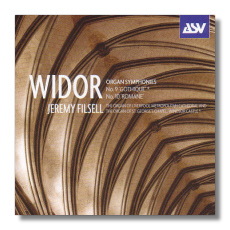
The Internet's Premier Classical Music Source
Related Links
- Widor Reviews
- Latest Reviews
- More Reviews
-
By Composer
-
Collections
DVD & Blu-ray
Books
Concert Reviews
Articles/Interviews
Software
Audio
Search Amazon
Recommended Links
Site News
 CD Review
CD Review
Charles-Marie Widor

Organ Symphonies
- Organ Symphony #9 "Gothique", Op. 70
- Organ Symphony #10 "Romane", Op. 73
Jeremy Filsell, organ
Academy Sound & Vision CDDCA1172 63m DDD
Charles-Marie Widor lived to be 93 and his life spans many generations. Born in 1844 when Mendelssohn was still alive, he experienced huge musical, social and political upheavals, but nonetheless, remained true to the romantic spirit until his death (and Ravel's) in 1937.
His Lyonnaise family were organ builders and his gifts for the instrument were apparent very early on. Throughout his life, he was the veritable embodiment of its splendour and might, especially across France, and by the turn of the century, he was the greatest influence and point of reference where organ building was concerned. With Camille Coll's help (he was a close friend of the family), he studied in Brussels and gained strong support from Saint-Saëns and Gounod. Through the latter's influence, he eventually got the Paris appointment in 1870 as master of the loft in Saint-Suplice, a position he was to remain in for over 60 years. He was one of the first romantics to conceive a symphony for solo instrument and his 10 organ symphonies are considered as the core of his vast repertoire. His first eight are, what one might call, secularised concert suites, but the "Gothique", Op. 70 (#9) and "Romane", Op. 73 (#10), written in 1894/95 and 1900 respectively, are full of specific liturgical elements, in spite of Widor's lukewarm attitude towards religion in general.
Although written on an epic scale, these two pieces favour moderation, concentration and above all, unity. Other hallmarks include a high polyphonic language, together with intricate elaboration and a register of profuse imagination. Jeremy Filsell gives immaculate and inspiring interpretations, full of eloquent beauty and regal nobility, and his ardent advocacy for these works will certainly enhance their popularity even more. Another gem of a disc in AS&V's long and outstanding series of French organ works.
Copyright © 2005, Gerald Fenech




















